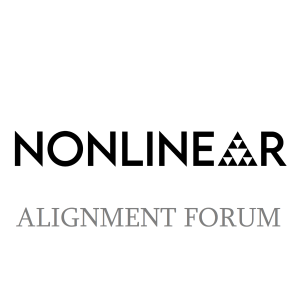

The Nonlinear Library: Alignment Forum
AF - InterLab - a toolkit for experiments with multi-agent interactions by Tomáš Gavenčiak
2024-01-22
Link to original articleWelcome to The Nonlinear Library, where we use Text-to-Speech software to convert the best writing from the Rationalist and EA communities into audio. This is: InterLab - a toolkit for experiments with multi-agent interactions, published by Tomáš Gavenčiak on January 22, 2024 on The AI Alignment Forum.
This post introduces InterLab, a toolkit for experiments with multi-agent interaction. We plan to release more posts on the overall project, technical details, de...
Link to original article
Welcome to The Nonlinear Library, where we use Text-to-Speech software to convert the best writing from the Rationalist and EA communities into audio. This is: InterLab - a toolkit for experiments with multi-agent interactions, published by Tomáš Gavenčiak on January 22, 2024 on The AI Alignment Forum.
This post introduces InterLab, a toolkit for experiments with multi-agent interaction. We plan to release more posts on the overall project, technical details, design considerations, and concrete research projects and ideas over the next few weeks to months.
This post focuses on the motivation behind the project and touches upon more high-level considerations; if you want to jump to the implementation itself or want to start experimenting, you can jump directly to the Getting started section, to the InterLab GitHub repo with project overview and further links, or explore the example Google Colab notebook.
Motivation
The research agenda of ACS is primarily focused on understanding complex interactions of humans and AI agents, both on individual level and between systems or institutions, and both theoretically and empirically.
Future going well in our view depends not just on the narrow ability to point one AI system to some well specified goal, but broadly on a complex system composed of both AIs and humans to develop in a way which is conducive to human flourishing. This points to a somewhat different set of questions than traditional AI safety, including problems such as "how to deal with the misalignment between individual humans, or between humans and institutions?", "how to avoid AIs amplifying conflict?", "how will institutions running on AI cognition (rather than human cognition) work?", "how do aggregate multi-agent entities evolve?", or "what happens if you replace part of human-human interactions in the society with AI-AI interactions?".
While many of these questions likely require a better theoretical and conceptual understanding, it is also possible to study them empirically, using LLMs and LLM-based agents, which can also inform our models and intuitions.
We may build more comprehensive language model evaluations for near-term alignment, in particular in the direction of multi-agent evaluations - this is indeed one of the goals of InterLab.
We may learn about strategies for resolving conflicts and disagreements, and robust cooperation, as well as models of manipulation and coercion, in particular under information and power imbalances.
We may create new technologies for human coordination, cooperation and empowerment, such as negotiation aids or aids for solving internal conflicts in individual humans.
Multi-agent systems of humans and AIs come with a specific and understudied set of risks (longer report forthcoming).
Better empirical understanding of systems of interacting LLMs can help us better understand the space of intelligent systems occupied by collective intelligences and superagents.
There is some risk of over-updating our models and intuitions based on the current AI systems that needs to be taken into account, but alignment theory developed more in touch with experiments seems like a useful direction.
Another intuition behind this work is the insight that sometimes it is easier to understand or predict the behavior of a system of agents as a whole and based on simplified models, rather than to e.g. model the individuals accurately and then model the system primarily as a collection of individuals. For example, modeling the flow of passengers in a metropolitan transit system is notably easier than understanding individual humans and their reasons why they move in some particular ways. (In fact, some systems in human civilization are specifically designed to avoid the outcome being too influenced by properties of individuals, e.g.
Empirical language model research and experimentation are taking off quickly both within industry and mainstream ML and other fields (social sciences, fairness) and it is hardl...
View more
Welcome to The Nonlinear Library, where we use Text-to-Speech software to convert the best writing from the Rationalist and EA communities into audio. This is: InterLab - a toolkit for experiments with multi-agent interactions, published by Tomáš Gavenčiak on January 22, 2024 on The AI Alignment Forum.
This post introduces InterLab, a toolkit for experiments with multi-agent interaction. We plan to release more posts on the overall project, technical details, design considerations, and concrete research projects and ideas over the next few weeks to months.
This post focuses on the motivation behind the project and touches upon more high-level considerations; if you want to jump to the implementation itself or want to start experimenting, you can jump directly to the Getting started section, to the InterLab GitHub repo with project overview and further links, or explore the example Google Colab notebook.
Motivation
The research agenda of ACS is primarily focused on understanding complex interactions of humans and AI agents, both on individual level and between systems or institutions, and both theoretically and empirically.
Future going well in our view depends not just on the narrow ability to point one AI system to some well specified goal, but broadly on a complex system composed of both AIs and humans to develop in a way which is conducive to human flourishing. This points to a somewhat different set of questions than traditional AI safety, including problems such as "how to deal with the misalignment between individual humans, or between humans and institutions?", "how to avoid AIs amplifying conflict?", "how will institutions running on AI cognition (rather than human cognition) work?", "how do aggregate multi-agent entities evolve?", or "what happens if you replace part of human-human interactions in the society with AI-AI interactions?".
While many of these questions likely require a better theoretical and conceptual understanding, it is also possible to study them empirically, using LLMs and LLM-based agents, which can also inform our models and intuitions.
We may build more comprehensive language model evaluations for near-term alignment, in particular in the direction of multi-agent evaluations - this is indeed one of the goals of InterLab.
We may learn about strategies for resolving conflicts and disagreements, and robust cooperation, as well as models of manipulation and coercion, in particular under information and power imbalances.
We may create new technologies for human coordination, cooperation and empowerment, such as negotiation aids or aids for solving internal conflicts in individual humans.
Multi-agent systems of humans and AIs come with a specific and understudied set of risks (longer report forthcoming).
Better empirical understanding of systems of interacting LLMs can help us better understand the space of intelligent systems occupied by collective intelligences and superagents.
There is some risk of over-updating our models and intuitions based on the current AI systems that needs to be taken into account, but alignment theory developed more in touch with experiments seems like a useful direction.
Another intuition behind this work is the insight that sometimes it is easier to understand or predict the behavior of a system of agents as a whole and based on simplified models, rather than to e.g. model the individuals accurately and then model the system primarily as a collection of individuals. For example, modeling the flow of passengers in a metropolitan transit system is notably easier than understanding individual humans and their reasons why they move in some particular ways. (In fact, some systems in human civilization are specifically designed to avoid the outcome being too influenced by properties of individuals, e.g.
Empirical language model research and experimentation are taking off quickly both within industry and mainstream ML and other fields (social sciences, fairness) and it is hardl...
Comments (3)
More Episodes
All Episodes>>Create Your Podcast In Minutes
- Full-featured podcast site
- Unlimited storage and bandwidth
- Comprehensive podcast stats
- Distribute to Apple Podcasts, Spotify, and more
- Make money with your podcast
It is Free












